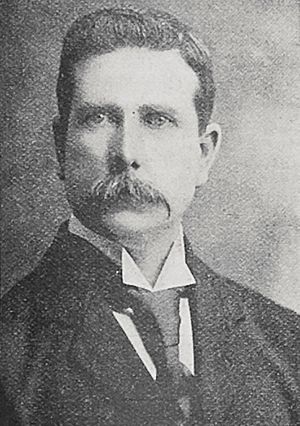William Joseph Napier facts for kids
Quick facts for kids
William Joseph Napier
|
|
|---|---|
 |
|
| Member of the New Zealand Parliament for City of Auckland |
|
| In office 1899–1902 |
|
| Preceded by | James Job Holland |
| Succeeded by | Frederick Baume |
| Personal details | |
| Born | 1857 Ireland |
| Died | 28 November 1925 Auckland, New Zealand |
| Political party | Liberal |
William Joseph Napier (born in 1857, died on 28 November 1925) was an important person in New Zealand. He was a lawyer and a politician. He was a Member of Parliament for the City of Auckland from 1899 to 1902. He belonged to the Liberal Party.
Contents
William Napier's Early Life
William Napier was born in Ireland. When he was five years old, his family moved to New Zealand. He went to school at St Peter's School, Auckland Grammar School, and St John's College, Auckland. These schools helped him prepare for his future career.
Napier's Legal Career
William Napier became a lawyer. This means he helped people with legal problems. He was allowed to work as a lawyer in New Zealand in 1883. A few years later, in 1886, he could also work as a lawyer in Fiji.
He gave advice to important leaders. For example, he advised Mata'afa Iosefo, a ruler in Samoa. He also worked for Sir George Grey, who was a former Governor of New Zealand. Napier also helped Māori leaders like Te Kooti and Rewi Maniapoto. He even advised another Samoan ruler, Malietoa Tanumafili I, and the government of Tonga.
Becoming a Politician
William Napier was also interested in politics. This means he wanted to help make decisions for the country.
| New Zealand Parliament | ||||
| Years | Term | Electorate | Party | |
| 1899–1902 | 14th | City of Auckland | Liberal | |
He first tried to become a Member of Parliament in the 1890 election election. He ran in the City of Auckland area. He was one of seven people trying to win, and he came in fifth place.
Napier was successfully elected to Parliament in 1899. He represented the City of Auckland. However, he was not re-elected in 1902. In 1901, he was in charge of a special committee that looked at laws.
Besides Parliament, Napier was involved in other public roles. He was a member of the Auckland Harbour Board from 1893 to 1907. This board managed the port in Auckland. For some time, he was even its chairman. He also helped start and lead the Navy League and the Victoria League in New Zealand. These groups supported the navy and connections with other countries. For nine years, he was a captain in the Devonport coastguard artillery, which helped protect the coast.
He tried to get back into Parliament in the 1908 election election. He ran in the Waitemata area. He lost to another candidate, Leonard Phillips, in a second vote. He tried again in 1911 election in the same area. He won the first vote, but again lost to Phillips in the second vote.
Later Years and Legacy
In 1910, William Napier was recognized for his achievements. He was made a fellow of the North British Academy of Arts.
He also had an interest in sports. In 1914, he became the president of the Sunnyside Rugby League Football Club. This rugby team played on the North Shore of Auckland. The club later joined with another team, North Shore Albions, in 1920. Napier did not continue as president after 1915. The former Prime Minister of New Zealand, Joseph Ward, became the club's patron.
William Napier passed away in a hospital in Auckland on 28 November 1925. He was survived by his wife and two sons. He is buried at Hillsborough Cemetery.

